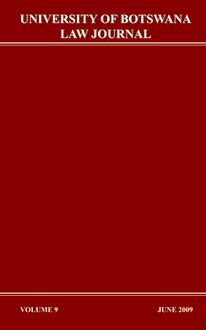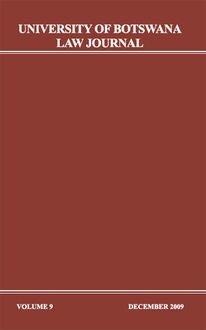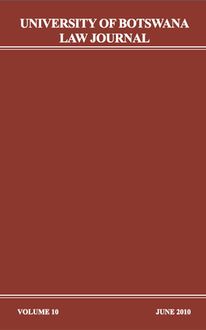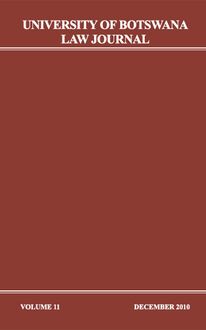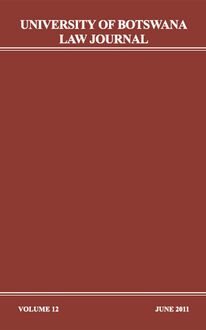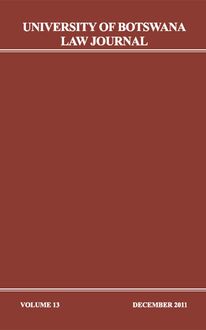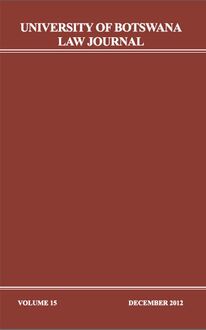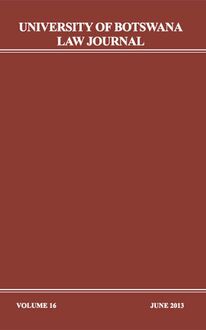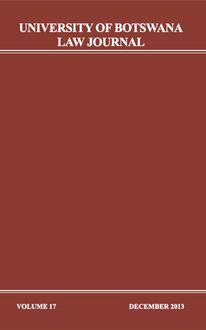-
 Univers
Univers
-
 Ebooks
Ebooks
-
 Livres audio
Livres audio
-
 Presse
Presse
-
 Podcasts
Podcasts
-
 BD
BD
-
 Documents
Documents
-
- Cours
- Révisions
- Ressources pédagogiques
- Sciences de l’éducation
- Manuels scolaires
- Langues
- Travaux de classe
- Annales de BEP
- Etudes supérieures
- Maternelle et primaire
- Fiches de lecture
- Orientation scolaire
- Méthodologie
- Corrigés de devoir
- Annales d’examens et concours
- Annales du bac
- Annales du brevet
- Rapports de stage
La lecture à portée de main
102 pages
English
University of Botswana Law Journal Volume 15, December 2012 , livre ebook
102 pages
English
YouScribe est heureux de vous offrir cette publication

Description
The University of Botswana Law Journal is a peer refereed journal published twice a year. It provides a forum for scholars and practitioners to reflect on diverse legal issues of national, regional and international significance and of local and regional relevance.PatronThe Hon. Justice Nganunu, Chief Justice of BotswanaInternational Editorial Advisory BoardProf. D. D. N. Nsereko, Judge, International Criminal Court, The Hague, The NetherlandsProf. W. Du Plessis Faculty of Law, North-West University (Potchefstroom Campus), South Africa Prof. T. Maluwa H. Laddie and Linda P. Montague Professor of Law, Dickinson School of Law, Penn. State University, USA Prof. M. Reisman Myres McDougal Professor of Law, Yale Law School, New Haven, USA Prof. K. Frimpong Ghana Institute of Management and Public Administration, (GIMPA), Accra, Ghana Prof. S. Roberts Department of Law, London School of Economics, United Kingdom Prof. A. McCall Smith Edinburgh Law School, University of Edinburgh, United Kingdom Prof. C. Forsyth Faculty of Law, Robinson College, University of Cambridge, United Kingdom Prof. B. Othlogile Vice Chancellor, University of Botswana Dr. A. Molokomme Attorney-General, BotswanaEditorial BoardProf. Peter Takirambudde Editor-in-Chief, University of BotswanaMrs. E. Macharia-Mokobi Secretary, University of BotswanaDr. K. Solo University of BotswanaProf. C. Ngongola University of BotswanaProf. J. Kiggundu University of BotswanaProf. E. K. Quansah University of BotswanaDr. O. B. Tshosa University of BotswanaMr. T. Sebego Vice chairman, Law Society of Botswana
Sujets
Informations
| Publié par | PULP (Pretoria University Law Press) |
| Nombre de lectures | 0 |
| Langue | English |
Extrait
UNIVERSITY OF BOTSWANA LAW JOURNAL
VOLUME 15 DECEMBER 2012
ARTICLES
The constitutionality of judicial corporal punishment in Botswana ...........3 Bonolo Ramadi Dinokopila Tebogo Edison Tladi
An appraisal of the new legal framework for the regulation ....................29 of non-banking financial institutions in Botswana Kealeboga N. Bojosi
Guilty before trial: Presumption of innocence and the public ..................53 parading of criminal suspects before the press in Uganda R. Kakungulu-Mayambala
NOTES
Mmusi & OrsvRamantele & Another: An opportunity missed...............81 to begin the burial ofAttorney GeneralvUnity Dow? Gosego Rockfall Lekgowe
RECENT LEGAL DEVELOPMENTS
South Africa -
Siyambonga Heleba and Busi Kgori.......................91
ARTICLES
3
The constitutionality of judicial corporal punishment in Botswana
ABSTRACT
Bonolo Ramadi Dinokopila* Tebogo Edison Tladi**
In 1984 the Court of Appeal of Botswana, inClover Petrus and AnothervThe Statedeclined to rule on the question whether judicial corporal punishment is inherently inhuman and degrading form of punishment or treatment. There has never been any constitutional challenge against corporal punishment laws on the basis that they perpetuate discrimination and unequal treatment in Botswana. At the heart of Botswana’s Constitution lie the principles of equality and non-discrimination. The Constitution further provides for protection against inhuman and degrading treatment. This article carries out a survey of Botswana laws that provide for and govern the application of corporal punishment as a criminal sanction. The article argues that these laws, especially those applied by the courts in the criminal justice system, are inherently unconstitutional to the extent that they sanction unjustified discrimination on the basis of sex or gender and or violate the right to equality. It shall further be shown that the manner in which corporal punishment is applied constitutes another infringement of the constitutional guarantees in that it qualifies as inhuman and degrading treatment. This article will put forward an argument that a constitutional challenge against corporal punishment is more than appropriate. Finally this article recommends that judicial corporal punishment must be abolished in Botswana.
1.
INTRODUCTION
Like most countries that are party to numerous International Human Rights instruments, Botswana has since independence in 1966 been adjusting laws towards the accomplishment of international best practice on human rights. This is evident from the Bill of Rights found in Botswana’s Constitution, which
* Senior Lecturer, Department of Law, University of Botswana, Gaborone & Doctoral Candidate, Centre for Human Rights, University of Pretoria, South Africa. ** Final year, Bachelor of Laws (LLB) Candidate, Department of Law, University of Botswana, Gaborone.
4 UNIVERSITY OF BOTSWANA LAW JOURNAL DECEMBER 2012
Bill of Rights is informed by and crafted in line with the Universal Declaration 1 of Human Rights (UDHR). At the heart of this Constitution lie the principles of equality and non-discrimination. To that end Botswana is governed by a Constitution that guarantees all citizens equal protection of the law. Several legal developments have therefore been focused towards alleviating historical 2 gender based discrimination and other inequalities. However, little has been done in the area of criminal law and punishment. It will be shown herein that an opportunity for legal reform – with a view to abolishing unjustified gender/ sex discrimination – is presented by our current laws on corporal punishment. A reading of the Constitution and other related statutes leads one to the conclusion that lawful or judicial punishment is a sanction permissible under criminal law as it obtains under the Penal Code and or other statutes that 3 create offences and prescribe punishment. This article therefore proceeds on the premise that generally criminal sanctions must comport with the principles of equality and non-discrimination. This article focuses on the legitimacy of judicial corporal punishment in the form of flogging or whipping. The principal law creating offences and prescribing punishments thereof is the Penal Code and corporal punishment is one of the punishments 4 created by the Penal Code. It is noteworthy that the Penal Code was adopted 5 by Botswana in 1964, two years before the adoption of the Constitution. This Penal Code was to a large extent influenced by and reflected in most areas the 6 criminal law of England. However, at the time of drafting of the Penal Code 7 judicial corporal punishment had been abolished in England in 1948. Interestingly corporal punishment found its way into the new Penal Code for an emerging African democracy. It was retained possibly out of deference to customary law as it obtained in the then Bechuanaland and the wide acceptance of corporal punishment as a normal mode of punishment in the territory. The Penal Code has since independence been amended many times but corporal punishment has survived through the years and it is likely to be 8 retained in the statute books for the foreseeable future. The implementation of judicial corporal punishment is governed
1
2
3
4 5
6 7 8
Attorney GeneralvDow1992 BLR 119 at pp. 152-153;GoodvAttorney General(No.2) [2005] 2 BLR 337 (C.A) at p. 349. TheDowcase (note 1 above) influenced the Amendment of the Citizenship Act, [Cap 10:01], Laws of Botswana, to allow Batswana women married to foreigners to pass their citizenship to their children, a right which was formerly enjoyed by Batswana men to the exclusion of women; the 2004 Abolition of Marital Power Act, [Cap 29:07], Laws of Botswana is another legal development aligned to realizing gender equality and non-discrimination; the case ofKamanakao I And AnothervAttorney General[2001] 2 BLR 654 influenced the amendment of 77, 78 and 79 of the Constitution removing objectionable provisions creating inequality between tribes. Kgafela & OthersvThe StateCase No. CLHLB-000148-10 (unreported). See p. 18 paragraph 25 of the Judgment. Sections 25 (c) and 28 of [Cap 08:01], Laws of Botswana. I..G. Brewer, “Sources of the Criminal Law of Botswana”,18 Journal of African Law,(1974), pp. 24 – 36 at p. 28. Ibid. Section 2 of the English Criminal Justice Act, 1948. Counting from Amendment Act No. 42 of 1967 the last amendment was Act No. 14 of 2005.
JUDICIAL CORPORAL PUNISHMENT IN BOTSWANA 5
9 primarily by the Criminal Procedure and Evidence Act and the Customary 10 Courts Act. In 1982 more severe corporal punishment sentences were 11 introduced by the Criminal Procedure and Evidence Act. However, the provisions were declared unconstitutional by the Court of Appeal and later 12 repealed. The Court of Appeal however maintained that corporal punishment as provided for before the amendments remainedintra viresthe 13 Constitution of Botswana. The offending provisions were therefore removed and the law restored to its pre-amendment shape. However, there has never been any constitutional challenge against corporal punishment laws on the basis that they perpetuate discrimination on the basis of sex. This article will put forward an argument that a constitutional challenge against corporal punishment is more than appropriate. The interplay between all these laws, their Constitutional implications and the general attitude of the courts concerning the said laws will be herein discussed. This article carries out a survey of Botswana laws that provide for and govern the application of corporal punishment as a criminal sanction. The intent is to show that these laws, especially those applied by the courts in the criminal justice system, are inherently unconstitutional to the extent that they sanction unjustified discrimination on the basis of sex or gender and or violate the right to equality. It shall further be argued that the manner in which corporal punishment is applied constitutes another infringement of the constitutional guarantees in that it qualifies as inhuman and degrading treatment. In doing so, the article will address four main issues namely; (i) the nature and scope of corporal punishment laws; (ii) the Constitutional protection against discrimination, equality and corporal punishment in Botswana; (iii) corporal punishment as inhuman and/or degrading treatment; and (iv) the attitude of the courts concerning corporal punishment laws. The article will culminate in a discussion of recommendations for law reform.
9 10 11
12 13
[Cap 08:02], Laws of Botswana. [Cap 04:05], Laws of Botswana. Act No. 21 of 1982 amending Section 301 of the Criminal Procedure and Evidence Act, [Cap 08:02], Laws of Botswana, provided that: “Section 301 of the Criminal Procedure and Evidence Act is hereby amended by adding at the end of subsection (2) thereof, the following new subsections– (3) Nothwithstanding anything to the contrary contained in Section 61(2) of the Magistrates' Courts Act and Section 30 of the Penal Code and the preceding provisions of this Section where a person is sentenced under Sections 235, 297, 298 and 305 to 308 of the Penal Code to undergo corporal punishment, such person shall be given four strokes each quarter in the first and last years of his term of imprisonment and such strokes shall be administered in traditional manner with traditional instrument at such places as may be specified by the Minister”.See Petrus & AnothervThe State[1984] BLR 14 (CA) at p. 19. Petrus & AnothervThe State[1984] BLR 14 (CA). Ibid,at pp. 30 – 31.
6 UNIVERSITY OF BOTSWANA LAW JOURNAL DECEMBER 2012
2.
2.1
THE NATURE AND SCOPE OF CORPORAL PUNISHMENT LAWS IN BOTSWANA
Corporal punishment in Botswana
The application of corporal punishment by Botswana courts is limited to offences created by the Penal Code or other written laws in force in 14 Botswana. The Penal Code provides that “no person shall be sentenced to undergo corporal punishment for any offence unless such punishment is 15 specifically authorized by this Code or any other law”. The phrase “any other law” can only mean written law pursuant to Section 10(8) of the Constitution 16 and Section 12(6) of the Customary Courts Act. These two provisions provide that a person can only be charged with a criminal offence if such offence is described in the Penal Code or any written law as an offence and the penalty thereof is prescribed. Section 3 of the Penal Code specifically excludes common law 17 offences as a basis for liability to punishment under Botswana criminal law. Customary law offences are also excluded from the criminal law of Botswana 18 19 to the extent that customary law is unwritten. InBimbovState The the High Court quashed a conviction where the Appellant had been convicted of adultery by a customary court and sentenced to a fine. The simple ratio of this decision was that adultery was not an offence under any statute in force in Botswana and as such could not be deemed to be a criminal offence in the jurisdiction. It has been argued that this position is not as trite as it may be 20 usually posited. More than ten years later, Boko’s assertion that the position is not as trite as it may be put forward, bears some strong relevance. This 21 assertion is underscored by the case ofKgafela & OthersvThe State.In that case the Appellants argued that the Constitution allowed them to flog people 22 for customary law offences. In support of that argument they invoked the provisions of the Constitution authorising a court to convict a person of a 23 criminal offence under any customary law to which they are subject. The
14
15 16 17 18 19 20
21 22
Section 28 of [Cap 08:01], Laws of Botswana. The phrase “any other law” can only mean written law pursuant to Section 10 (8) of the Constitution and Section 12 (6) of the Customary Courts Act [Cap 04:05]. These two provisions provide that a person can only be charged with a criminal offence if such offence is described in the Penal Code or any written law and the penalty thereof is prescribed in a written law. Section 3 of the Penal Code specifically excludes common law offences as a basis for liability to punishment under Botswana criminal law. It is submitted that customary law offences are also impliedly excluded from the criminal law of Botswana to the extent that customary law is unwritten. Parliament has not enacted any law authorising convictions for Customary Law offences. Ibid. [Cap 04:05], Laws of Botswana. Penal Code, Section 3. Section 10 (8) Constitution of Botswana. H.Ct. Cr. App. No. 56 (1980) (unreported). D. G. Boko, “Fair Trial and Customary Courts in Botswana”, 11Criminal Law Forum, (2000), pp. 445-460 at p. 448. CLHLB- 000148-10 (unreported) at p. 23 of the Judgment. Ibid,p. 7 of the Judgment.
JUDICIAL CORPORAL PUNISHMENT IN BOTSWANA 7
24 Court acknowledged that the Constitution authorises “a court” to convict a person of a criminal offence under any customary law to which, by virtue of 25 that law, such person is subject. This begs the question whether the Constitution acknowledges the existence of customary law offences under the criminal law of Botswana? The High Court cleared this confusion by reconciling Section 12 (6) of the Customary Courts Act and the above Constitutional provision by holding that:
“The pre-existence of a criminal offence under customary law is also recognised under Section 10 (12) (e) of the Constitution. However, Parliament has, under Section 12 (6) of the Customary Courts Act, prohibited the charging of any person for a criminal offence unless such offence is created by the Penal Code or some 26 other written law.”
From the above quotation it is clear that the court was saying that, in so far as a customary law offence has not yet found its way into a Parliamentary enactment it cannot be a criminal offence. It is clear therefore that criminal offences can only be ascertained from written laws or statutes and therefore customary law offences in their purest and original nature do not formpart of the criminal law of Botswana. As aforementioned, the primary enactment of corporal punishment in 27 Botswana is found in the Penal Code. The Penal Code provides for, among 28 other forms of punishment, infliction of corporal punishment. The Penal Code does not define “corporal punishment” nor does the Criminal Procedure 29 and Evidence Act (CP&E). The latter simply describes corporal punishment 30 as “a sentence of caning …” It further provides that the caning shall be carried out in a manner and with a cane of a type approved by “the Minister” who may also approve different types of canes for different classes of 31 persons. The Act further provides for two preconditions for the application of corporal punishment namely that the; (i) the convict must be certified by a medical officer to be fit for caning; (ii) the caning can only be carried out in the presence of medical officer or a magistrate (if the medical officer is not 32 available). In the event that the convict is certified to be fit for caning but appears not to be so fit during the caning, the medical officer or the magistrate
23 24 25 26 27 28 29 30 31 32
Section 10(12)(e). see p. 7 of the Judgment. Ibid. CLHLB- 000148-10 (unreported) at p. 23 of the Judgment. Ibid,at p. 18, paragraph 25. [Cap 08:01], Laws of Botswana. Ibid, Section 25. [Cap 08:02], Laws of Botswana. Ibid,Section 305(1). Ibid. Section 305(1)(b) of [Cap 08:02], Laws of Botswana.
8 UNIVERSITY OF BOTSWANA LAW JOURNAL DECEMBER 2012
33 shall immediately stop the infliction of further punishment. The CP&E further provides that no sentence of caning shall be 34 carried out by instalments. In terms of the Penal Code a sentence of corporal punishment shall be inflicted once only. The sentence must specify the number of strokes, which shall not exceed twelve (12) for adults, in the case 35 of a person under the age of 18 years, six (6). The Customary Courts 36 (Corporal Punishment) Rules provides that no instrument other than a cane orthupashall be used to inflict corporal punishment. The use of thesjambok 37 is also expressly outlawed. It is further provided that corporal punishment 38 must be applied on the buttocks only and on no other part of the body. It is required by the said rules that where a cane is used, protection shall be placed 39 over the kidneys before corporal punishment is inflicted. Corporal punishment must be carried out in a “traditional manner with traditional 40 instruments” and must be carried out privately in a prison or in such places 41 as the Minister may designate. As aforementioned, the CP&E provides that the person receiving corporal punishment must have been certified by a medical practitioner to be fit to receive corporal punishment. This begs the question whether one can really ever be said to be fit, in medical sense, to receive wound causing 42 punishment? In theKgafelaChief of the Bakgatla tribe was chargedcase the with assault occasioning actual bodily harm contrary to Section 247 of the Penal Code. The alleged offences arose from the allegedly extrajudicial 43 application of corporal punishment by the appellants. The charge in that case implies that the victims’ bodies had been injured in one way or another as 44 a result of being caned. It is noteworthy that a similar ‘thupa’ is and has over the years been used by Bakgatla customary courts and indeed other customary
33 34 35 36 37 38 39 40
41 42 43
Ibid. Ibid, Section 305 (1) (d). [Cap 08:01] Section 28 (2). [Cap 04:05] Rules 1-3. Rule 2 of the Customary Courts (Corporal Punishment) Rules, [Cap 04:05], Laws of Botswana. Ibid,Rule 3 (1). Ibid, Rule 3 (2). Section 305 (3), Criminal Procedure and Evidence Act, [Cap 08:02], Laws of Botswana. However, none of the relevant Acts defines the words “traditional manner”. It was found as a fact in theKgafelacase that flogging in the traditional manner means “flogging on the bare back.” See p. 10 paragraph 14 of the Judgment. It can be therefore be inferred from theKgafelacase(supra)read with the Customary Courts (Corporal Punishment) Rules requirement that flogging be carried out on the buttocks only (see note 37 above)that “traditional manner” means flogging on the bare buttocks. Ibid,Section 305 (2),(3). See note 21 above. The instrument used in floggings in this case was‘thupa’, the same instrument prescribed for use under the Customary Courts (Corporal Punishment) Rules. The instrument used was therefore not in issue. The appellants contended that they were allowed by the Constitution to apply corporal punishment on the complainants in the impugned manner. The contentious issues, among others, revolved around whether the complainants were punished legally in the sense of being punished for criminal offences ascertainable from “written laws”; whether the appellants constituted “a court” empowered to pass corporal punishment sentences; and whether the complainants were punished following a trial. In answering these questions in the negative the Court concluded that the appellants` impugned conduct was not saved by the Constitution.
JUDICIAL CORPORAL PUNISHMENT IN BOTSWANA 9
courts when imposing corporal punishment. Therefore even if it is inflicted within its legal framework, corporal punishment produces injuries on the recipient`s body. The statutory measures taken before corporal punishment can be inflicted provide proof that the punishment is potentially dangerous to human life. It is a form of punishment that clearly carries serious medical risks 45 which may occur instantly upon the infliction of such punishment. Certain groups of people are however excluded from the imposition of corporal punishment by the Penal Code. In particular, no sentence of corporal punishment shall be passed upon females, males sentenced to death 46 and males “whom the court considers to be more than forty years of age.” 47 The Customary Courts Act also makes provision for corporal punishment within the jurisdiction of Customary Courts. The Customary Courts Act further exempts females and any person of the age over the age of 40 years or 48 over from corporal punishment. It is not clear why these groups of people are excluded from the imposition of corporal punishment. The irony of this is that men who are sentenced to death, a method of punishment which is even more inhuman and degrading, are exempt from the imposition of corporal punishment. Perhaps for those who are aged 40 years and above it could be argued that they are so disqualified because of their age. For several years, the imposition of corporal punishment on men, to the exception of women, has not been challenged. It has been viewed as appropriate and perhaps as reflecting the views of the society, that it is considered inappropriate to impose corporal punishment on women. It is perhaps appropriate to highlight that the position that women must never be subjected to corporal punishment dates as far back as 1935. 49 Through Proclamation no. 75 of 1934 the British had decreed that women 50 should not be subjected to corporal punishment. The Resident Commissioner in his explanatory memorandum highlighted that the purpose of the proclamation was, among other things, to guard against excessive use of 51 the powers of the chiefs. Beyond that, there is no other explanation as to why women are exempted from corporal punishment. Historically, both men 52 and women were subjected to corporal punishment. It is in that context
44
45
46 47 48 49 50
51 52
“Harm” is defined under Section 2 of the Penal Code as “any bodily hurt, disease or disorder whether permanent or temporary.” This definition has been held to include any form of bodily injury or mental injury short of wounding. See K. Frimpong and A.M. Smith,The Criminal Law of Botswana,Cape Town, Juta & Co. Ltd, (1992), at p. 63.SeegenerallyStatevBaiphethi[1984] BLR 232 (HC). The protection over the kidneys and general requirement for medical examination before punishment, punishment can also be stopped if the recipient proves unfit to receive the remaining strokes of the cane. Section 28(3)(a)(b)(c), Penal Code (supra). [Cap 04:05], Laws of Botswana. Section 18(2) Customary Courts Act (supra). th Section 12(2)(c). The Proclamation was promulgated on the 4 January 1935. Explanatory memorandum by His Excellency the High Commissioner on the Bechuanaland Protectorate Native Administration and Native Tribunals Proclamations, 28 December 1934, 7 (available at http:// www.elaws.gov.bw/). Ibid. I. Schapera,A Handbook of Tswana Law and Custom,Oxford, Oxford University Press (1938) at p. 49.
10 UNIVERSITY OF BOTSWANA LAW JOURNAL DECEMBER 2012
surprising that corporal punishment was eventually only applied to men, with a few exceptions, to the exclusion of women. It is submitted that – from the perspective of both men and women – this is discriminatory. The following two section of this article therefore highlights why corporal punishment is inhuman and degrading treatment.
2.2
The application of corporal punishment in Botswana as inhuman and degrading treatment
One unfortunate feature of corporal punishment in Botswana is that the Botswana Court of Appeal has previously declined to determine the question whether corporal punishmentper seamounts to inhuman and degrading 53 treatment. The latter issue arose in the case ofClover Petrus & AnothervThe 54 State.In that case, the two appellants had been sentenced to imprisonment with corporal punishment by a magistrate court in accordance with the CP & E which provided that:
“Such person shall be given four strokes each quarter in the first and last years of his term of imprisonment and such strokes shall be administered in traditional manner with traditional instrument at 55 such places as may be specified by the Minister.”
The appellants argued,inter alia,delayed and repeated corporal that punishment as provided for by the above provision constituted inhuman and degrading punishment and was in contravention of Section 7 of the 56 Constitution. It was further argued that corporal punishment under those circumstances could not be covered by the exception under Section 7(2) of the 57 Constitution. The Court of Appeal upheld this argument and set aside the sentences. The Court held that Section 301 as amended wasultra vires the Constitution and that corporal punishment administered in instalments amounted to inhuman and degrading treatment. It is apposite to note that an argument was raised by the Appellants that the mere imposition of corporal punishment, as may be prescribed by any law, was contrary to Section 7 of the Constitution. The majority of the Court was of the opinion that a determination could not be made with respect to that
53 54 55 56
57
Clover Petrus & AnothervThe State[1984] BLR 14 (CA). [1984] BLR 14 (CA). Section 301(3) as Amended by Act No. 21 of 1982. Section 7 of the Constitution provides: (1) No person shall be subjected to torture or to inhuman or degrading punishment or other treatment. (2) Nothing contained in or done under the authority of any law shall be held to be inconsistent with or in contravention of this Section to the extent that the law in question authorizes the infliction of any description of punishment that was lawful in the country immediately before the coming into operation of this Constitution. Section 7(2) above.
JUDICIAL CORPORAL PUNISHMENT IN BOTSWANA 11
argument considering that the issue was not properly placed before the court for determination. In the end the Court did not make a determination on whether the imposition of corporal punishment “in traditional manner with traditional instrument” or generally, was contrary to the Constitution. Baron JA (dissenting) was of the view that the issue should not have been left 58 open. Aguda JA was however unambiguous in his pronouncement as regards whether corporal punishment, including one carried out in traditional manner, should continue to exist despite that it isper seand inhuman degrading treatment. He said:
“I have no doubt in my mind that judicial flogging of an adult is a degrading form of punishment, but so long as the world community has not reached that stage when it can be abolished throughout the world, just as slavery has been abolished, it must continue to exist in 59 some countries.”
He further pointed out that:
“Whatever views one may have of corporal punishment of an adult as a form of punishment for an offence, it is, in so far as Botswana is concerned, saved by subsection (2) of section 7 of the 60 Constitution.”
It appears that the question whether corporal (or any) punishment constitutes inhuman or degrading punishment under this Section is a two pronged 61 inquiry. That is: (i) whether the punishment is inherently inhuman and/or 62 degrading and; (ii) whether the law authorising such punishment authorises the infliction of any description of punishment that was lawful in the country 63 immediately before the coming into operation of the Constitution. If the
58
59 60 61
62 63
Note 53 above, at p. 31 C-F, Baron JA said: “It was however with considerable hesitation and only because of the importance of conveying our decision without delay that I concurred in making no finding on the question of corporal punishment ‘in traditional manner with traditional instrument’. This is an issue of great moment in the field of human rights and a question on which I think the legislature would have appreciated comment by this court. It was fully argued, and was, I venture to think, the more important issue; certainly it is the more controversial. It is not the type of issue which falls to be decided only if another question is decided in a particular way, and there was in my view ample material before the court to enable a decision to be made. On further and more leisurely reflection, therefore, I have come to the conclusion that the issue should not have been left open.” Clover Petrus(supra), p. 40. Ibid. InClover Petrus, the Court first considered whether corporal punishment applied in instalments constitutes inhuman and degrading treatment and answered that question positively; secondly the court considered whether the same punishment was saved by Section 7(2) of the Constitution; that is, whether corporal punishment applied in instalments existed in any law immediately before the cominginto operation of the Constitution and answered that question in the negative. It is submitted that this approach clearly shows a two pronged enquiry. Section 7(1) of the Constitution, the general principle. Section 7(2) of the Constitution, the exception to the general principle.
-
 Univers
Univers
-
 Ebooks
Ebooks
-
 Livres audio
Livres audio
-
 Presse
Presse
-
 Podcasts
Podcasts
-
 BD
BD
-
 Documents
Documents
-
Jeunesse
-
Littérature
-
Ressources professionnelles
-
Santé et bien-être
-
Savoirs
-
Education
-
Loisirs et hobbies
-
Art, musique et cinéma
-
Actualité et débat de société
-
Jeunesse
-
Littérature
-
Ressources professionnelles
-
Santé et bien-être
-
Savoirs
-
Education
-
Loisirs et hobbies
-
Art, musique et cinéma
-
Actualité et débat de société
-
Actualités
-
Lifestyle
-
Presse jeunesse
-
Presse professionnelle
-
Pratique
-
Presse sportive
-
Presse internationale
-
Culture & Médias
-
Action et Aventures
-
Science-fiction et Fantasy
-
Société
-
Jeunesse
-
Littérature
-
Ressources professionnelles
-
Santé et bien-être
-
Savoirs
-
Education
-
Loisirs et hobbies
-
Art, musique et cinéma
-
Actualité et débat de société
- Cours
- Révisions
- Ressources pédagogiques
- Sciences de l’éducation
- Manuels scolaires
- Langues
- Travaux de classe
- Annales de BEP
- Etudes supérieures
- Maternelle et primaire
- Fiches de lecture
- Orientation scolaire
- Méthodologie
- Corrigés de devoir
- Annales d’examens et concours
- Annales du bac
- Annales du brevet
- Rapports de stage
Signaler un problème
YouScribe
Le catalogue
Le service
© 2010-2024 YouScribe
